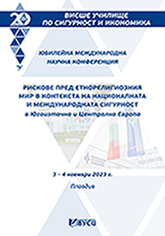Етнодемографска стратификация в България – динамика от далечната 1986 до близката 2019 и новото малцинство от бежанци през 2023 г. Рискове и предизвикателства пред националната сигурност
Author(s): Mihail Stoyanov Mirchev / Language(s): English,Bulgarian
/ Publication Year: 0
Keywords: national representative survey; stratification pyramid and profiles; transition; social polarization; macro-range analyses; Social model; socialism; neoliberal capitalism; Globalization; Arabic-Islami
The paper presents own empirical data of national representative surveys, valid for current resident population within Bulgaria, aged 18-70, conducted by Agency ASSA-M with comparable samples. It focuses the stratification pyramid of Bulgarian population and its shifts from 1986 – the end of the „developed socialism“ epoch, through transitory 2001-2011 decade, up to 2019. The paper discusses the civil effect in the stratification profile in four focal points – in 2001 after the so called „Transition“ (1989-1999), that was the First Transition from socialism to liberal capitalism; in 2011 after the social optimism decade regarding Bulgaria’s accession to the EU – that is the Second Transition (2007); in 2019, that where 5 years after the time of Third Transition (2014-2017), that was the time of total mafiatization of the State and Government – as a substance that was the return to the model of one party and one political leather domination, in the state and manifestations of new feudalism and authoritarianism. The macro-range of the shifts in the system of the Bulgarian society, which resulted in a sharply changed stratification profile and society’s civil model is characterized. It is not only about the Base of the society, but also about the complete reconstruction in the society’s Superstructure, of the new ideological dogma and political correctness in the state. It is also about the abrupt and radical relocation of Bulgaria from East to West in its global positioning as a country and Bulgarian nation. All is analyzed as inner social and societal, state and institutional environment of civil uncertainty and national security problem. As a base of increased risk of illegal Arab-Muslim immigration from 2014 up to now, the aggregation of risky mass of eastern „refugees“ in Bulgaria and their sitting here as a new „national minority“ which doubles and triples the problems of Bulgarian national security.The paper presents own empirical data of national representative surveys, valid for current resident population within Bulgaria, aged 18-70, conducted by Agency ASSA-M with comparable samples. It focuses the stratification pyramid of Bulgarian population and its shifts from 1986 – the end of the „developed socialism“ epoch, through transitory 2001-2011 decade, up to 2019. The paper discusses the civil effect in the stratification profile in four focal points – in 2001 after the so called „Transition“ (1989-1999), that was the First Transition from socialism to liberal capitalism; in 2011 after the social optimism decade regarding Bulgaria’s accession to the EU – that is the Second Transition (2007); in 2019, that where 5 years after the time of Third Transition (2014-2017), that was the time of total mafiatization of the State and Government – as a substance that was the return to the model of one party and one political leather domination, in the state and manifestations of new feudalism and authoritarianism. The macro-range of the shifts in the system of the Bulgarian society, which resulted in a sharply changed stratification profile and society’s civil model is characterized. It is not only about the Base of the society, but also about the complete reconstruction in the society’s Superstructure, of the new ideological dogma and political correctness in the state. It is also about the abrupt and radical relocation of Bulgaria from East to West in its global positioning as a country and Bulgarian nation. All is analyzed as inner social and societal, state and institutional environment of civil uncertainty and national security problem. As a base of increased risk of illegal Arab-Muslim immigration from 2014 up to now, the aggregation of risky mass of eastern „refugees“ in Bulgaria and their sitting here as a new „national minority“ which doubles and triples the problems of Bulgarian national security.
More...

